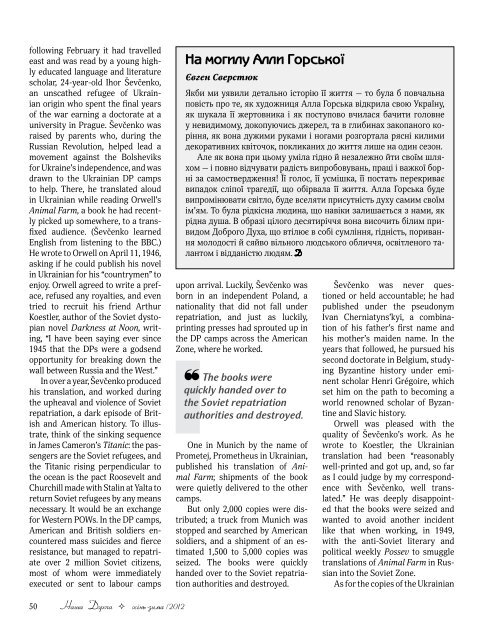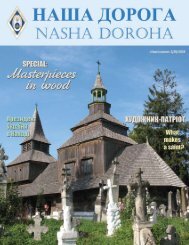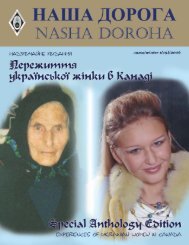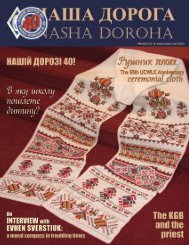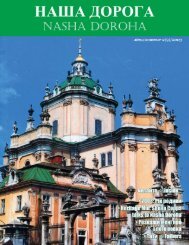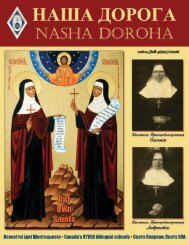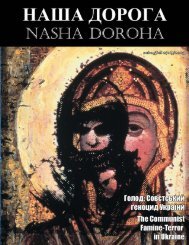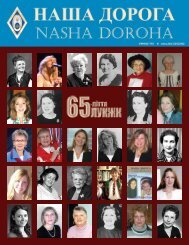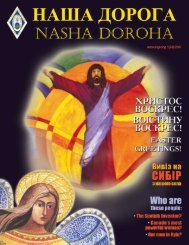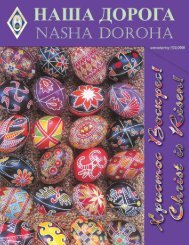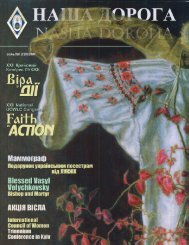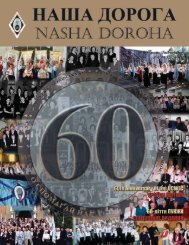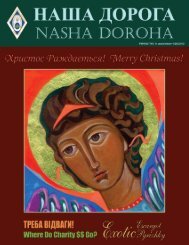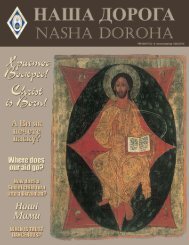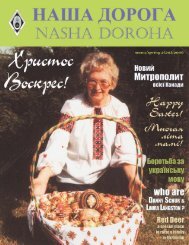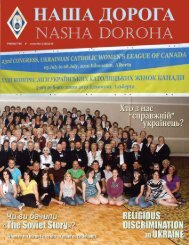Ð¥ÑиÑÑÐ¾Ñ Ð½Ð°ÑодивÑÑ! - UCWLC
Ð¥ÑиÑÑÐ¾Ñ Ð½Ð°ÑодивÑÑ! - UCWLC
Ð¥ÑиÑÑÐ¾Ñ Ð½Ð°ÑодивÑÑ! - UCWLC
You also want an ePaper? Increase the reach of your titles
YUMPU automatically turns print PDFs into web optimized ePapers that Google loves.
following February it had travelled<br />
east and was read by a young highly<br />
educated language and literature<br />
scholar, 24-year-old Ihor Ševčenko,<br />
an unscathed refugee of Ukrainian<br />
origin who spent the final years<br />
of the war earning a doctorate at a<br />
university in Prague. Ševčenko was<br />
raised by parents who, during the<br />
Russian Revolution, helped lead a<br />
movement against the Bolsheviks<br />
for Ukraine’s independence, and was<br />
drawn to the Ukrainian DP camps<br />
to help. There, he translated aloud<br />
in Ukrainian while reading Orwell’s<br />
Animal Farm, a book he had recently<br />
picked up somewhere, to a transfixed<br />
audience. (Ševčenko learned<br />
English from listening to the BBC.)<br />
He wrote to Orwell on April 11, 1946,<br />
asking if he could publish his novel<br />
in Ukrainian for his “countrymen” to<br />
enjoy. Orwell agreed to write a preface,<br />
refused any royalties, and even<br />
tried to recruit his friend Arthur<br />
Koestler, author of the Soviet dystopian<br />
novel Darkness at Noon, writing,<br />
“I have been saying ever since<br />
1945 that the DPs were a godsend<br />
opportunity for breaking down the<br />
wall between Russia and the West.”<br />
In over a year, Ševčenko produced<br />
his translation, and worked during<br />
the upheaval and violence of Soviet<br />
repatriation, a dark episode of British<br />
and American history. To illustrate,<br />
think of the sinking sequence<br />
in James Cameron’s Titanic: the passengers<br />
are the Soviet refugees, and<br />
the Titanic rising perpendicular to<br />
the ocean is the pact Roosevelt and<br />
Churchill made with Stalin at Yalta to<br />
return Soviet refugees by any means<br />
necessary. It would be an exchange<br />
for Western POWs. In the DP camps,<br />
American and British soldiers encountered<br />
mass suicides and fierce<br />
resistance, but managed to repatriate<br />
over 2 million Soviet citizens,<br />
most of whom were immediately<br />
executed or sent to labour camps<br />
50 Íàøà Äîðîãà îñiíü-çèìà/2012<br />
Íà ìîãèëó Àëëè Ãîðñüêî¿<br />
Євген Сверстюк<br />
Якби ми уявили детально історію її життя — то була б повчальна<br />
повість про те, як художниця Алла Горська відкрила свою Україну,<br />
як шукала її жертовника і як поступово вчилася бачити головне<br />
у невидимому, докопуючись джерел, та в глибинах закопаного коріння,<br />
як вона дужими руками і ногами розгортала рясні килими<br />
декоративних квіточок, покликаних до життя лише на один сезон.<br />
Але як вона при цьому уміла гідно й незалежно йти своїм шляхом<br />
— і повно відчувати радість випробовувань, праці і важкої борні<br />
за самоствердження! Її голос, її усмішка, її постать перекриває<br />
випадок сліпої трагедії, що обірвала її життя. Алла Горська буде<br />
випромінювати світло, буде вселяти присутність духу самим своїм<br />
ім’ям. То була рідкісна людина, що навіки залишається з нами, як<br />
рідна душа. В образі цілого десятиріччя вона височить білим привидом<br />
Доброго Духа, що втілює в собі сумління, гідність, поривання<br />
молодості й сяйво вільного людського обличчя, освітленого талантом<br />
і відданістю людям.<br />
upon arrival. Luckily, Ševčenko was<br />
born in an independent Poland, a<br />
nationality that did not fall under<br />
repatriation, and just as luckily,<br />
printing presses had sprouted up in<br />
the DP camps across the American<br />
Zone, where he worked.<br />
❝<br />
The books were<br />
quickly handed over to<br />
the Soviet repatriation<br />
authorities and destroyed.<br />
One in Munich by the name of<br />
Prometej, Prometheus in Ukrainian,<br />
published his translation of Animal<br />
Farm; shipments of the book<br />
were quietly delivered to the other<br />
camps.<br />
But only 2,000 copies were distributed;<br />
a truck from Munich was<br />
stopped and searched by American<br />
soldiers, and a shipment of an estimated<br />
1,500 to 5,000 copies was<br />
seized. The books were quickly<br />
handed over to the Soviet repatriation<br />
authorities and destroyed.<br />
Ševčenko was never questioned<br />
or held accountable; he had<br />
published under the pseudonym<br />
Ivan Cherniatyns’kyi, a combination<br />
of his father’s first name and<br />
his mother’s maiden name. In the<br />
years that followed, he pursued his<br />
second doctorate in Belgium, studying<br />
Byzantine history under eminent<br />
scholar Henri Grégoire, which<br />
set him on the path to becoming a<br />
world renowned scholar of Byzantine<br />
and Slavic history.<br />
Orwell was pleased with the<br />
quality of Ševčenko’s work. As he<br />
wrote to Koestler, the Ukrainian<br />
translation had been “reasonably<br />
well-printed and got up, and, so far<br />
as I could judge by my correspondence<br />
with Ševčenko, well translated.”<br />
He was deeply disappointed<br />
that the books were seized and<br />
wanted to avoid another incident<br />
like that when working, in 1949,<br />
with the anti-Soviet literary and<br />
political weekly Possev to smuggle<br />
translations of Animal Farm in Russian<br />
into the Soviet Zone.<br />
As for the copies of the Ukrainian


